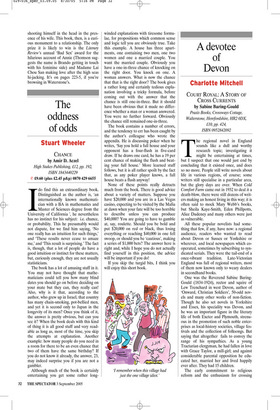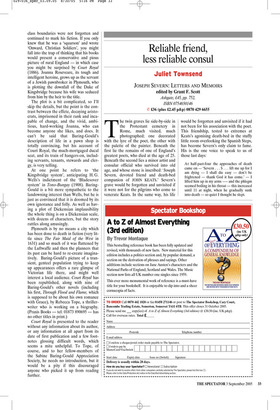A devotee of Devon
Charlotte Mitchell
COURT ROYAL: A STORY OF CROSS CURRENTS by Sabine Baring-Gould Praxis Books, Crossways Cottage, Walterstone, Herefordshire, HR2 0DX, £10, pp. 424, ISBN 0952842092 The regional novel in England sounds like a dull and worthy research topic; investigating it might be entertaining at times, but I suspect that one would just end by concluding that it existed once, and does so no more. People still write novels about life in various regions, of course; some writers still specialise in a particular area, but the glory days are over. When Cold Comfort Farm came out in 1932 to deal it a death-blow, there were still dozens of writers making an honest living in this way; it is often said to mock Mary Webb’s books, but Sheila Kaye-Smith, Eden Phillpotts, Alice Dudeney and many others were just as vulnerable.
All these popular novelists had something that few, if any, have now: a regional audience, readers who wanted to read about Devon or Sussex or Yorkshire or wherever, and local newspapers which cooperated, sometimes by subscribing to syndicated serials. They were the tail-end of a once-vibrant tradition. Late-Victorian England was full of regional writers, most of them now known only to weary dealers in secondhand books.
One was the Reverend Sabine BaringGould (1834-1924), rector and squire of Lew Trenchard in west Devon, author of ‘Onward, Christian Soldiers’, 50-odd novels and many other works of non-fiction. Though he also set novels in Yorkshire and Essex, his speciality was Devon, and he was an important figure in the literary life of both Exeter and Plymouth, strenuous in the promotion of such noble enterprises as local-history societies, village festivals and the collection of folksongs. But saying that altogether fails to convey the range of his sympathies. As a young Tractarian clergyman, he had fallen in love with Grace Taylor, a mill-girl; and against considerable parental opposition he educated her, married her and lived happily ever after. They had 15 children.
The early commitment to religious reform and the enthusiasm for crossing class boundaries were not forgotten and continued to mark his fiction. If you only knew that he was a ‘squarson’ and wrote ‘Onward, Christian Soldiers’, you might fall into the trap of thinking that his books would present a conservative and pious picture of rural England — in which case you might be surprised by Court Royal (1886). Joanna Roseveare, its tough and intelligent heroine, grows up as the servant of a Jewish pawnbroker in Plymouth, who is plotting the downfall of the Duke of Kingsbridge because his wife was seduced from him by the heir to the title.
The plot is a bit complicated, so I’ll skip the details, but the point is the contrast between the effete, decaying aristocrats, imprisoned in their rank and incapable of change, and the vivid, ambitious, hard-working Joanna, who can become anyone she likes, and does. It can’t be said that Baring-Gould’s description of life in a pawn shop is totally convincing, but his account of Court Royal, the much-mortgaged ducal seat, and its train of hangers-on, including servants, tenants, stewards and clergy, is very telling.
At one point he refers to ‘the Kingsbridge system’, anticipating H. G. Wells’s indictment of the ‘Bladesover system’ in Tono-Bungay (1908). BaringGould is a bit more sympathetic to the landowning interest than Wells, but he is just as convinced that it is doomed by its own ignorance and folly. As well as having a plot of Dickensian implausibility the whole thing is on a Dickensian scale, with dozens of characters, but the story rattles along amusingly.
Plymouth is by no means a city which has been done to death in fiction (very little since The Fair Maid of the West in 1631) and so much of it was flattened by the Luftwaffe and then the planners that its past can be hard to re-create imaginatively. Baring-Gould’s picture of a transient, genteel population trying to keep up appearances offers a rare glimpse of Victorian life there, and might well interest a local audience. Court Royal has been republished, along with nine of Baring-Gould’s other novels (including his first, Through Flood and Flame, which is supposed to be about his own romance with Grace), by Rebecca Tope, a thrillerwriter who is working on a biography. (Praxis Books — tel: 01873 890695 — has no other titles in print.) Court Royal is presented to the reader without any information about its author, or any information at all apart from its date of first publication and a few footnotes glossing difficult words, which seems a mite unhelpful. To Tope, of course, and to her fellow-members of the Sabine Baring-Gould Appreciation Society, he needs no introduction, but it would be a pity if this discouraged anyone who picked it up from reading further.










































 Previous page
Previous page